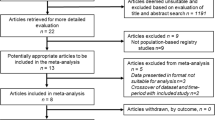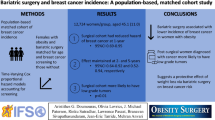Abstract
We reviewed the evidence for bariatric surgery reducing the risk of breast cancer. Data was extracted from multiple libraries, including PubMed, EMBASE, and Medline, to perform a systematic review. Abstracts were reviewed by two independent reviewers. Thirty-eight full-text articles were identified from 1171 abstracts. Four studies were included for meta-analysis; 114 of 10,533 (1.1%) patients receiving bariatric surgery versus 516 of 20,130 (2.6%) controls developed breast cancer, odds ratio 0.564 (95% CI 0.453 to 0.702) using a fixed effects model (P < 0.001) and odds ratio 0.585 (95% CI 0.247 to 1.386) using a random effects model (P 0.223). Bariatric surgery may reduce the risk of breast cancer. More research is required due to heterogeneity of studies, difficulty in identifying accurate controls, and limited follow-up.


Similar content being viewed by others
References
Wang YC, McPherson K, Marsh T, et al. Health and economic burden of the projected obesity trends in the USA and the UK. Lancet. 2011;378(9793):815–25.
Esposito K, Chiodini P, Colao A, et al. Metabolic syndrome and risk of cancer: a systematic review and meta-analysis. Diabetes Care. 2012;35(11):2402–11.
Reeves MJ, Newcomb PA, Remington PL, et al. Body mass and breast cancer. Relationship between method of detection and stage of disease. Cancer. 1996;77(2):301–7.
Chlebowski RT, Aiello E, McTiernan A. Weight loss in breast cancer patient management. J Clin Oncol Off J Am Soc Clin Oncol. 2002;20(4):1128–43.
Subbaramaiah K, Howe LR, Bhardwaj P, et al. Obesity is associated with inflammation and elevated aromatase expression in the mouse mammary gland. Cancer Prev Res (Phila). 2011;4(3):329–46.
Key TJ, Appleby PN, Reeves GK, et al. Circulating sex hormones and breast cancer risk factors in postmenopausal women: reanalysis of 13 studies. Br J Cancer. 2011;105(5):709–22.
Byers T, Sedjo RL. Does intentional weight loss reduce cancer risk? Diabetes, Obes & Metab. 2011;13(12):1063–72.
Fabian CJ, Kimler BF, Donnelly JE, et al. Favorable modulation of benign breast tissue and serum risk biomarkers is associated with >10% weight loss in postmenopausal women. Breast Cancer Res Treat. 2013;142(1):119–32.
Sjostrom L, Gummesson A, Sjostrom CD, et al. Effects of bariatric surgery on cancer incidence in obese patients in Sweden (Swedish Obese Subjects Study): a prospective, controlled intervention trial. Lancet Oncol. 2009;10(7):653–62.
Dixon JB, O'Brien PE, Playfair J, et al. Adjustable gastric banding and conventional therapy for type 2 diabetes: a randomized controlled trial. JAMA. 2008;299(3):316–23.
Casagrande DS, Rosa DD, Umpierre D, et al. Incidence of cancer following bariatric surgery: systematic review and meta-analysis. Obes Surg. 2014;24(9):1499–509.
Stroup DF, Berlin JA, Morton SC, et al. Meta-analysis of observational studies in epidemiology: a proposal for reporting. Meta-analysis Of Observational Studies in Epidemiology (MOOSE) group. JAMA. 2000;283(15):2008–12.
Saruc M, Boler D, Karaarslan M, et al. Intragastric balloon treatment of obesity must be combined with bariatric surgery: a pilot study in Turkey. Turk J Gastroenterol Off J Turk Soc Gastroenterol. 2010;21(4):333–7.
Wells G, Shea B, O'Connell D, Peterson J, Welch V, Losos M. Newcastle-Ottawa Quality Assessment Scale, cohort studies. 2014.
Adams TD, Stroup AM, Gress RE, et al. Cancer incidence and mortality after gastric bypass surgery. Obesity. 2009;17(4):796–802.
Christou NV, Lieberman M, Sampalis F, et al. Bariatric surgery reduces cancer risk in morbidly obese patients. Surg Obes Relat Dis. 2008;4(6):691–5.
McCawley GM, Ferriss JS, Geffel D, et al. Cancer in obese women: potential protective impact of bariatric surgery. J Am Coll Surg. 2009;208(6):1093–8.
Gagne DJ, Papasavas PK, Maalouf M, et al. Obesity surgery and malignancy: our experience after 1500 cases. Surg Obes Relat Dis. 2009;5(2):160–4.
Hunsinger MA. Maximizing weight loss after Roux-en-Y gastric bypass may decrease risk of incident organ cancer.
Ostlund MP, Lu Y, Lagergren J. Risk of obesity-related cancer after obesity surgery in a population-based cohort study. Ann Surg. 2010;252(6):972–6.
Gusenoff JA, Koltz PF, O'Malley WJ, et al. Breast cancer and bariatric surgery: temporal relationships of diagnosis, treatment, and reconstruction. Plast Reconstr Surg. 2009;124(4):1025–32.
Renehan A. Obesity and overall cancer risk. European Journal of Cancer, Supplement. Conference:Joint ECCO 15 - 34th ESMO Multidisciplinary Congress. Berlin Germany. Conference Start: 20090920. Conference End: 4. Conference Publication: (var.pagings). 2009. 7 (2–3) (pp 79).
Renehan A. Obesity is a new major cause of cancer. Obesity facts. Conference: European Obesity Summit(EOS):1st Joint Congress of EASO and IFSO-EC. Gothenburg Sweden. Conference Start: 20160601. Conference End: 4. Conference Publication: (var.pagings). 2016. 9 (pp 17).
Wolin KY, Carson K, Colditz GA. Obesity and cancer. Oncologist. 2010;15(6):556–65.
Ungefroren H, Gieseler F, Fliedner S, et al. Obesity and cancer. Horm Mol Biol Clin Invest. 2015;21(1):5–15.
Arditi JD, Venihaki M, Karalis KP, et al. Antiproliferative effect of adiponectin on MCF7 breast cancer cells: a potential hormonal link between obesity and cancer. Horm Metab Res. 2007;39(01):9–13.
Sanchez RC, Ibanez C, Klaassen J. The link between obesity and cancer. Revista Medica De Chile. 2014;142(2):211–21.
Modesitt SC, Hallowell PT, Slack-Davis JK, et al. Women at extreme risk for obesity-related carcinogenesis: baseline endometrial pathology and impact of bariatric surgery on weight, metabolic profiles and quality of life. Gynecol Oncol. 2015;138(2):238–45.
Fuerst M. Evidence that obesity raises risk of death in young women with ER-positive breast cancer. Oncol Times. 2014;36(12):12–4.
Rothman KJ. BMI-related errors in the measurement of obesity. Int J Obes. 2008;32:S56–S9.
Ward KK, Roncancio AM, Shah NR, et al. Bariatric surgery decrease the risk of uterine malignancy. Gynecol Oncol. 2014;133:63–6.
Acknowledgements
The authors thank Avinesh Pillai from the University of Auckland for his assistance with statistical analysis.
Funding
No funding was received for this project.
Author information
Authors and Affiliations
Corresponding author
Ethics declarations
Conflict of Interest
The authors declare that they have no conflicts of interest.
Disclosures
For this type of study, formal consent was not required. This article does not contain any studies with human participants or animals performed by any of the authors.
Appendix. Search Terms
Appendix. Search Terms
Obesity/morbid obesity/abdominal obesity/high body mass index/abdominal fat/adiposity/weight gain/body fat/intra-abdominal fat/overnutrition/body fatness/diabetic obesity/adipose tissue
bariatric surgery/bariatrics/gastroplasty/stomach bypass/gastric bypass/Roux-en-Y/biliopancreatic diversion/biliopancreatic bypass/jejunoileal bypass/bariatric medicine/gastric banding/laparoscopic adjustable gastric banding/sleeve gastrectomy/duodenal switch
Breast cancer/breast neoplasm/mammary cancer/mammary gland cancer/advanced breast cancer/early breast cancer/breast carcinoma/breast adenocarcinoma/breast metastasis/inflammatory breast cancer/intraductal carcinoma/neoplasm/cancer
Risk reduction/risk/cancer risk/population risk/risk benefit
((post-menopausal/post menopause) (not used in all databases))
Rights and permissions
About this article
Cite this article
Winder, A.A., Kularatna, M. & MacCormick, A.D. Does Bariatric Surgery Affect the Incidence of Breast Cancer Development? A Systematic Review. OBES SURG 27, 3014–3020 (2017). https://doi.org/10.1007/s11695-017-2901-5
Published:
Issue Date:
DOI: https://doi.org/10.1007/s11695-017-2901-5




